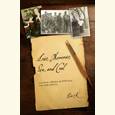Across the Alley
What you know about your neighbors isn’t always enough to illuminate what you don’t
Their car is a dark-green Chevy Blazer. A year ago I saw the man—husband? boyfriend?—drive it down the alley fast with one front tire missing. The bald rim made a big, demonic noise against the pavement—the terrible end of something, a severe mistake. I jumped from the couch to see what it was. The man drove like this back and forth, rapidly; he gunned the engine for a trip of several hundred feet in reverse, gunned it and drove back the way he came, repeated the circuit. He was killing the car, I thought. This will be the end of their car. Now the Blazer rumbles on, with four tires but only one headlight thanks to a bashed front-end.
 They were in this neighborhood before my boyfriend and I were, and I suspect they’ll be here when we leave. Theirs is a sad and angry life. The woman’s voice itself is a caricature: coarse, booze and smoke-ravaged. She tends to shout and taunt and grumble sarcastically—all of her fury and misery spat fiercely at the man.
They were in this neighborhood before my boyfriend and I were, and I suspect they’ll be here when we leave. Theirs is a sad and angry life. The woman’s voice itself is a caricature: coarse, booze and smoke-ravaged. She tends to shout and taunt and grumble sarcastically—all of her fury and misery spat fiercely at the man.
She has pale skin and thick copper, wavy hair, usually in a ponytail; she favors stonewashed jeans, studded belts, tank tops. She’s neither fat nor thin. The man is darker, shorter, and bearded, thinning on top, often in the same clothes for several days. They are a textbook image of domestic strife: the woman leans out of the third-floor window, where a Puerto Rican flag hangs as a shade, screaming and throwing the man’s belongings at him in the paved area behind their building. Our back porch, or fire escape, faces the alley; there’s a garage in between us and the back of their building. That garage blocks a lot of their interaction when I’m on the porch. Sometimes they park the Blazer in there, but usually they leave it parked in the alley. You can see how they do not defy cliché.
I watch them from this porch-escape of our third-floor apartment, where, when the weather’s kind, we drink our coffee and beer, grill on our diminutive grill. I watch, braless and barefoot in my nightgown that maybe I haven’t taken off all day. I watch them and wait for one of them to glance up and see me, obviously watching and listening, and hurl a few motherfucking bitches my way. In three years, they never have looked up. My stares grow more brazen. I don’t pretend to be reading or watering the plants. It’s the cunt-and-motherfucker show. And I watch it because of what their fights don’t give away.
In their open, high-volume disputes, their brazen displays of mutual disgust, they still manage to be ciphers. The context is lost between the pussy, the cunt, the motherfucker and bitch and shit. There is so much about their troubles, their day-to-day, that we don’t know. The blanks are well hidden between the tight weave of expletives. I did, recently, manage to pick up one repeated declaration from woman to man: I DO NOT SELL MY ASS, BITCH. DON’T YOU CALL ME A MOTHERFUCKIN’ WHORE, BITCH. I DO NOT SELL MY ASS.
Does she sell her ass? I think she does not. But she could. What they do when they are not in the alley or behind their building is as hidden as their insults are audible.
What do they do all day? They’re always coming and going. The Blazer pulls up with junk lashed to its roof: an old tub, some rusted panels. Or it pulls up with several large panes of glass in the back. When the man goes to pull them out, they’re shattered. He tugs slowly, releasing a gush of glass shards into the alley. He picks at what’s now a lake of splintered glass in his stack of panes, grabs chunks and tosses them on the ground. I can’t figure out what he’s doing, only that it’s a disaster, and he should be cursing, freaking out, but he’s not. The woman appears with a small broom and dustpan.
How they get by is something I don’t understand. So is why they stay together. The man has been exiled numerous times; last winter he often slept in the Blazer, parked in the alley. A piece of plywood was pulled over the windshield for privacy, clothing draped over the windows. But in their continuing disputes, their life in the same orbit if not always under the same roof, I’ve come to see that there’s a lot I don’t understand, so much I’ll never pick up from my third floor post.
Zanna, quit it, Todd says. Quit watching them. I ignore him.
Lately, there seems to be a fort in their backyard. The man is living there. All I can see from the porch is the top of the structure, crowned by some blankets and towels and maybe a tarp. Fort, shanty, whatever—he’s living in it. Why will she refuse him the house but allow a backyard fort? I end up feeling that I am very naïve, that there is frustratingly much about these two that I will never know. In fact, I do not have absolute proof that they are a couple. They could be relatives, though it’s true they look nothing alike.
She talks to the fort. I can see her standing near the building’s back door, and I know he’s in there. She’s so theatrical!—maybe because she’s drunk—her gestures sharp and venomous, a flinging of fingers and hips, jerks of the head. She struts and swivels around, points at the man. Something something drunk all day and take drugs at night; I can’t pick it all up, I feel taunted too.
A few times I’ve walked past them in the alley on my way to the bus stop. I’ve gotten that close and yet I’ve never been able to get a good long look at the woman’s face. I’ve seen enough to know it is as ravaged as any image you’ve by now formed in your head. I nod at them. I am dying to say: Hey, are you guys married? Dying to fill in just one detail, solve for one x. When I’ve passed by I’ve almost expected her to recognize me as the girl from the porch across the alley and say: Stop fucking watching us, bitch. But in proximity she seems as oblivious to me as ever.
I figure out eventually that the fort is nothing more than a metal swing with a tarp and other stuff piled on top. This is disappointing, because the tarp, etc. could be there just for shade, my theory of exile entirely false. I go to throw some stuff in the trash bins and take the opportunity to peer down the walkway from the alley into their backyard. I see his socked-and-sneakered feet sticking out from the covered area. I see that he is rocking to and fro.
I might have heard the woman laugh the other day, and it was an unfamiliar sound, a first in three years. And then, later that night, I heard her cry, also for the first time: a repetitive lurching cry, a sucking in and then a moan, repeat repeat. And then she got in the Blazer and drove away.

Copyright (c) 2015 by Susannah Felts. All rights reserved. Susannah Felts is a writer, editor, and educator in Nashville, as well as co-founder of The Porch Writers’ Collective, a nonprofit literary center. She is the author of This Will Go Down On Your Permanent Record, a novel, and numerous journal and magazine articles.


